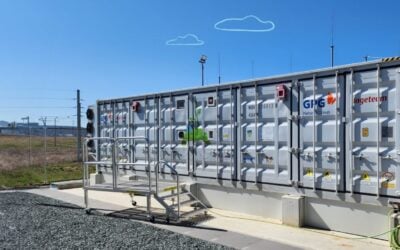Children in Rwanda. Image: wikimedia user: BanYan Tree.
Renewables with energy storage can help build low carbon energy networks in the developing world – but the twin technologies still face competition from natural gas while they gradually mature, according to an electric power systems maker and integrator.
Cleverson Takiguchi, of S&C Electric, a US-headquartered company which has worked in areas including storage integration, renewables interconnection to the grid and mircro grids, told PV Tech Storage yesterday that micro grids can increase access to electricity in economically poorer parts of the world, including some 400 million people on the African continent that have little to no access to electricity at all.
Enjoy 12 months of exclusive analysis
- Regular insight and analysis of the industry’s biggest developments
- In-depth interviews with the industry’s leading figures
- Annual digital subscription to the PV Tech Power journal
- Discounts on Solar Media’s portfolio of events, in-person and virtual
Brazilian Takiguchi, who is moving from a role as business development director for S&C’s operations in Africa to represent the company in sales in the EMEA regions, has over 20 years’ experience in the industry.
He said that while there has been strong interest in Africa, especially in South Africa and in Latin America and the company has built a number of pilot projects to prove that energy storage, solar and micro grids can reliably serve a useful purpose.
Some of the parameters being examined in these pilot projects include, Takiguchi said, finding out how various types of batteries react to the desert-like climate of northern South Africa, and the possibility of providing multiple grid services through energy storage facilities.
Going forward, he said, there could be opportunities in a number of areas such as data centres, while he also mentioned that so far he sees flow batteries as a “very promising” technology for applications in both regions due to the low degradation the batteries suffer even from prolonged and intensive use.
PV Tech Storage asked if, with the intergovernmental COP21 talks on climate change just a short time away in Paris, renewables-plus-storage offered a good hope for building lower carbon energy networks. Takiguchi said that it did, but still faced competition – although this too could be an opportunity.
“Of course the opportunity [to lower carbon emissions] will be to use energy storage as an enabler for renewables interconnection, but then, of course, it will still face competition with lower carbon emissions type of generation like gas.
“Gas, it is clear has much less emissions than the traditional coal-fired power plants. But this is still a very strong competition against renewables-plus-storage, so that’s where the opportunity lies.”
Winning that competition with gas over time therefore, is a feasible aim, Takiguchi said, but the drawback is that investors and other sources of funding have had many years to familiarise themselves with gas and less time to think about newer technologies like solar with batteries. It would, however, take time.
“The big challenge of course is that gas turbine is a well known technology, big track record so when you compare that with a solar plant, wind farm with energy storage, not all investors will look at it the same way as if you had, let’s say, a 1MW gas turbine and a 1MW solar PV or wind in combination with storage, they may not look the same. So this is where I say technology maturity will play its role.
“I’d say that competition, between lower carbon generation versus renewables-plus-storage is something that will be in the market for some years, at least until the technology gets more mature,” Takiguchi said.
In terms of opportunity, Africa may be richer in promise than many realise. A recent US$25 million funding round for Off Grid Electric, a another US-headquartered company, which is developing solar micro grids in Tanzania and Rwanda, was led by a contribution from DBL Partners.
'Magical formula'
‘Social impact’ investment firm DBL’s founder, Nancy Pfund, along with her co-founder Ihra Ehrenpreis was among early backers of SolarCity and Tesla among others. Pfund recently told PV Tech Storage that the link with decarbonisation and with lifting rural populations out of poverty made it a win-win investment choice for the VC funders, which only invests in programmes that have a positive social effect as well as generating healthy returns. These have included other recent investments in energy storage and related areas, Pfund explained in an interview with PV Tech Storage.
Pfund emphasised that the investment in Off Grid Electric and in Africa was not a handout or aid.
“We are totally non-concessionary. We are a top tier financial company and that’s our brand, it’s our mission, it’s in our DNA from Day One. So it’s a huge market and it has a lot of attributes that are very, very fundamental to the success of new entrants. So if we didn’t think we were going to make money on this we wouldn’t have made the investment.”
The numbers stacked up economically as well as in terms of the material impact DBL’s money could have, Pfund said. Falling costs of solar, wider recognition of battery-based energy storage technologies and innovative financing models analogous to the “no-money-down” revolution enjoyed in US rooftop solar leasing had made it possible.
“When you see that cost is coming in line with need and accessibility, that’s a very magical formula,” Pfund said.
“That hasn’t been totally possible until recently when panel costs came down, storage, lithium ion is now accessible, and you also have a business model innovation with the leasing model being applied to this continent. That was what broke open the solar market in the US – if you look at the growth numbers, once people didn’t have to buy a system and pay upfront and instead pay less monthly than their electricity bill, that’s when the market began to scale significantly.”






